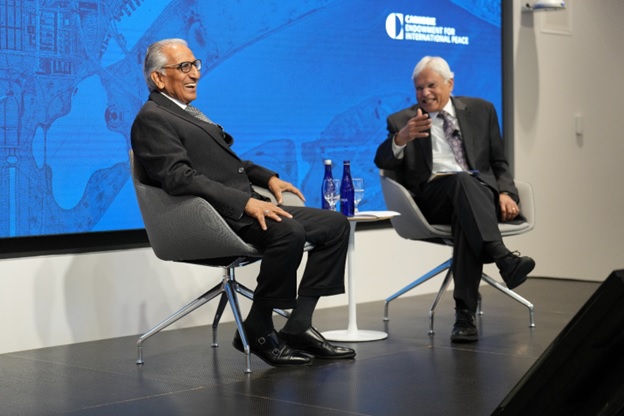
Pakistan Looks to Enhance Economic Capacity and Trade with US, Says Tariq Fatemi
By Elaine Pasquini
Photo by Phil Pasquini

Washington: Ambassador Tariq Fatemi, special assistant for foreign affairs to Prime Minister Shehbaz Sharif of Pakistan was the honored guest at the Carnegie Endowment for International Peace on March 27, 2025. The ambassador spoke on “Pakistan in the World: The Future of Global Engagement” before a large audience which included Rizwan Saeed Sheikh, Ambassador of Pakistan to the United States.
In welcoming remarks, Ashley J. Tellis, senior fellow in the Carnegie Endowment’s South Asia Program, noted “Pakistan is going through challenging times,” and thanked Ambassador Fatemi, his longtime friend, for addressing the audience on this important topic.
While the US and Pakistan have experienced disagreements over the decades since the country’s founding in1947, the two allies have been friends and “the core relationship has remained one of cordiality and confidence,” Amb Fatemi stated.
In all of Pakistan’s foreign policy relationships, Amb Fatemi said, the government led by Prime Minister Shehbaz Sharif “has made it clear…that we are not seeking friends in order to bolster our defense capacity. We are seeking friends in order to bring to Pakistan the possibility of the people of Pakistan having a better future in terms of employment possibilities and in terms of them getting to learn how to move ahead in life.”
Referring to several meetings with US senators and representatives in their Capitol Hill offices during his current visit to Washington, the ambassador urged them to: “Please look at Pakistan as a country of 241 million people living in a part of the world that is not only important to the US but is also consequential in terms of peace and stability in a very large area of South Asia.”
Ambassador Fatemi noted there is a tendency in Washington that “if you live next to a very large country the shadow it casts leaves you to look in directions that do not necessarily do justice for the smaller country.”
In the case of Pakistan, the small country is neighbors with India and China, two of the most populous countries in the world.
Relations with India are pivotal, he said, because it’s a country of 1.5 billion people with a strong, fast-growing economy. India also enjoys a close relationship with the United States, the ambassador said, “which has enabled them to enhance their capacities and undertake actions unilaterally” without giving consideration to oral or written understandings. “They engage in unilateral actions which are a concern to us,” he stressed.
Although Pakistan currently does not have a relationship with India, he noted, however, that “Pakistan is prepared to have warm, cordial, mutually beneficial relations with all its neighbors, but that relationship has to be based on a criterion that is just, fair and equitable.”
Pakistan’s diplomatic relations with China date back to 1951. Now, the two neighbors are engaged in economic projects and loans used to advance the country’s industrialization and infrastructure, he said. China’s Belt and Road Initiative and the China-Pakistan Economic Corridor have created major projects, most recently the Gwadar Port, Pakistan’s first deep sea facility.
Iran and Pakistan enjoy good relations, the ambassador said, but some of Iran’s interactions with other countries have sometimes had a negative impact on Pakistan.
And with respect to Afghanistan, Amb Fatemi stated his view that the US withdrawal from Afghanistan lacked the finesse that one associates with American initiatives. “It was quite haphazard…and chaotic,” he said. “And out of that chaos has emerged a regime in power that is proving to be a huge headache for us.”
Groups crossing the border from Afghanistan have committed acts of terror including an attack on Pakistanis during Ramadan. These security issues, he lamented, are a deterrent to attracting foreign investors and tourists to Pakistan, he said.
On the economic front, the ambassador noted the declining inflation rate, which according to the IMF is currently 1.4 percent down from 38 percent in 2023. Another good economic news, he related, is the World Bank’s recent approval of a ten-year assistance package of $20 billion.
Ambassador Fatemi also pointed out Pakistan’s rich mineral wealth which is attracting people from around the world. The Pakistan Minerals Investment Forum 2025 will convene in Islamabad the second week of April, which will include a delegation from the United States.
Lastly, the ambassador’s message to the United States, friends and colleagues, is that “we want the United States to look at Pakistan for what it is and not through the prism of other countries.”
Pakistan looks forward to relationships with the United States and others that is focused on “enhancing our economic capacity and trade. We want you to come and see what opportunities there are for our two countries to work together to enhance Pakistan’s economy in the sectors of education, health, medicine and IT.”
His country’s tens of thousands of young people are bright, intelligent and hard-working, and “they could be of huge help and assistance, both in terms of the expertise that they bring and the money that they will earn,” he stated.
“Pakistan’s focus, direction, desire and ambition is to create a peaceful and cooperative region in South Asia.”
(Elaine Pasquini is a freelance journalist. Her reports appear in the Washington Report on Middle East Affairs and Nuze.Ink.)

